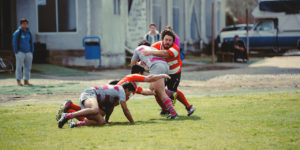Intermittent Fasting; can it be used during rugby season?
- Patrick Dale
- Nutrition
DISCLAIMER: This article explores the idea of caloric restriction. It should not be considered an endorsement of intermittent fasting by all rugby players. Please use this piece for it’s informational value and seek medical advice prior to beginning any kind of caloric restriction diet. Thanks and enjoy! – Training Team.
Intermittent fasting, or IF for short, is one of the many diets that you can use to help you lose fat. A fast is a period, predetermined or otherwise, where food intake is severely limited or avoided altogether. Intermittent fasts come in a variety of shapes and sizes including:
- 16/8 fast – fast for 16 hours, eat for 8 hours
- Day on/day off fast – as straight forward as it sounds
- 5:2 fast – eat normally for five days per week, fast for two usually non-consecutive days
- Daylight fast – you can only eat between sunset and sunrise
NB: It’s important to note that with any fast you should still consume plenty of water to stay properly hydrated. You can last several weeks without food, but too little water can soon land you in trouble.
Fasting – the oldest diet?
Fasting is nothing new – humankind has been fasting for a variety of reasons for as long as we’ve been calling planet Earth home. Our hunter/gatherer ancestors fasted intermittently when they did not catch anything to eat for a day or two, and many religious groups practice fasting; Christians fast during lent, and Muslims fast during Ramadan for example.
Most people also fast instinctively on occasion. If you feel unwell, you may forgo eating until you feel better – a form of fasting. And who hasn’t skipped a meal or two after a few too-many beers!
More recently, fasting has become a popular way to lose fat. Its appeal is obvious: it’s super-simple!
Fasting for fat loss – the benefits
As we discussed in this article, while body mass is important in rugby, carrying too much fat can slow you down and rob you of endurance, speed, and agility. If you are overweight or, more correctly, over fat, IF could help you lose fat quickly and easily. No tricky diets to follow, no need to give up your favorite foods, just choose your preferred IF eating schedule and stick to it.
Whether you skip a couple of meals, pushing breakfast back to 2-3 pm, or go 24 hours without food, you will create a calorie deficit which forces your body to burn fat for fuel. The result? Fairly effortless weight loss.
For example, if you normally eat three meals and two snacks per day which totals around 3,500 calories, skipping a couple of meals or not eating for 1-2 days per week will reduce your weekly energy intake by around 7,000 calories, producing a weight loss of around two pounds per week.
Obviously, this is an oversimplification, but you get the idea; by purposely eating fewer meals, you automatically reduce your calorie intake without having to change your diet in any other way. I told you it was simple!
Research conducted by the Poliquin Group (Ref 1.) suggests and supports the idea that intermittent fasting can work for athletes. Their examination of several studies revealed that IF leads to fat loss, increased muscle mass, and improved strength and performance. They’ve done similar research on ketogenic diets which shows similar (though less dramatic results)
Fasting is also said to increase insulin sensitivity which means that, when you break your fast, nutrients are preferentially directed toward your muscle and liver cells. This means that these nutrients are kept away from your fat cells which could lead to faster fat burning. In many ways, this is not dissimilar to the effect that exercise has on nutrient partitioning. Lower levels of blood glucose, combined with increased insulin sensitivity, are important factors not just for weight loss but for general metabolic health too.
Fasting drawbacks
Just because intermittent fasting is simple and effective, doesn’t mean it’s perfect. Before you try IF for yourself, make sure you are familiar with the problems associated with eating less often.
The biggest drawback of any type of fasting is that it can lead to hunger and then overeating when you eventually break your fast. If you break your fast with a binge, you could wipe out most or even all your calorie deficit which will derail fat loss and could even lead to fat gain. After all, it’s very easy to consume thousands of calories in a single sitting – just “go large” at the drive-through, add a milk shake and a fried apple pie on the side.
Another issue with fasting is that while is CAN lead to fat loss, it is possible to still eat very unhealthily as the focus is on calories and not nutrients. For example, you could fast for 18 hours, and then break your fast with toaster pastries and soda. You may still have the prerequisite calorie deficit for weight loss, but your body will be starved of vitamins, minerals, fiber, and protein. There is (or should be) more to fat loss than cutting calories; nutrients matter too.
Some intermittent fasters also feel weak during their periods without food. That’s no problem if the most exercise you do is walking from your car to your office desk. However, if you are a hard-charging rugger, this could make IF less attractive.
So, is intermittent fasting useful for ruggers? Should you use it during the rugby season? The answer is – maybe!
IF: is it for you?
If you are overweight, intermittent fasting can help you drop fat quickly, simply, and easily. However, in the same way you should not suddenly change your training during the playing season, a big dietary change could also be detrimental to your performance. Some people take to intermittent fasting like a duck to water, finding that it boosts energy and performance.
Other people experience a host negative of side effects including tiredness, weakness, severe hunger, brain fog, insomnia, and loss of concentration. You could try to overcome these deficits using a cognitive enhancer, but that might just be masking a more serious problem.
For this reason, if you fancy taking IF for a spin, you should do it before the season is in full swing or, better still, during the off-season. Granted, you can quickly revert to your previous diet if you discover that IF is not for you, but, by that point, your performance may have already taken a dip. One bad game is often all that is between your place on the team and a place on the subs’ bench.
One way around this is to try IF on rest/light training days only, and a couple of days before a game. For example:
Sunday – eat normally for post-match recovery (no training)
Monday – fast for 16 hours/eat for 8 (no/light training only)
Tuesday – eat normally (moderate + rugby training)
Wednesday – fast for 16 hours/eat for 8 (light training only)
Thursday – eat normally (moderate training)
Friday – eat normally (no training)
Sunday – eat normally (game day)
If your first foray into intermittent fasting is successful, you can increase the number of fasted days, increase training intensity on fasted days, and then reevaluate.
Making IF work for you
IF can work for ruggers, although we recommend you ease yourself in gradually during the rugby season or, better still, wait until the off-season to try it for yourself. Time your meals around activity so, for example, if you train late afternoon/evening, break your fast before your workout to fuel your session, and then eat again afterward to help recovery. Also, follow these Poliquin Group guidelines for modifying intermittent fasting for athletes:
- Protein consumption is crucial and fasting athletes should still consume 1.3-1.8 grams of protein per kilo of bodyweight per day to preserve muscle mass
- Protein should be consumed immediately after training to facilitate recovery and halt catabolism. Shoot for 20-30 grams as soon as your session is finished
- Longer feeding windows are recommended for hard-training athletes e.g. 8-12 hours
- There is a period of adaptation that may be accompanied by an initial loss of performance. However, once the athlete has adapted to IF, performance should return to normal. For this reason, do not start intermittent fasting during periods of intense/important competition
- Response to IF varies from individual to individual. For some IF works very well, for others it doesn’t work very well at all. Be prepared to experiment with different types of IF to find out what works best for you
- For best results, combine IF with a smart strength training plan
IF is very popular right now and could help you drop fat while preserving muscle mass and strength. But, because of bio-individuality, it’s not for everyone. If you need to drop fat, it’s one of many effective approaches. Be your own laboratory and experiment with IF, but do so with caution during the playing season.
Reference 1: Poliquin Group – Fasting for Athletes: Dangerous or Good Idea


